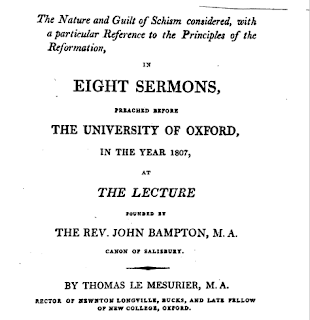"United in the same faith": Le Mesurier's Bampton Lectures on the separation of 1662
Related to this is Le Mesurier's traditional Old High view - rooted in Cranmer and Hooker - of the Prayer Book's ceremonies. These had no greater meaning than that they were "adopted simply for the sake of decency and of edification". No claim was made for the ceremonies beyond this. Indeed, he recognises them as human institutions - prudent and decent, yes, but still of human origin. Again, an important contrast can be made with Ritualist claims from mid-century onwards, with a wide range of new ceremonies endowed with meaning and authority far beyond what Le Mesurier, following Hooker and Cranmer, understood.
Reading this extract, then, is a reminder of the ruptures which would follow 1833, ruptures with the wisdom, prudence, and moderation of the Old High tradition:
it should seem hardly excusable, certainly not justifiable, for any person to separate from the communion of his fellows, united in the same faith, merely because they use ceremonies; as long, at least, as those ceremonies continue to be such as can not be shewn to be either unlawful in themselves, or leading directly to evil consequences. Yet, you well know, that this was the reason which in later times, was assigned by the great body of the dissenters in this country for their separation from our church. When pressed hard for the grounds of that separation, when it was urged that the use of the surplice, as well as the sign of the cross in baptism, were adopted simply for the sake of decency and of edification, they persisted in objecting to them, even to the perpetuating of the schism, purely and nakedly upon the ground that there was no express warrant of Christ and his apostles for the use of those particular forms, that they were therefore impositions of men, and that to such impositions they would not submit.
Now, without recurring to that argument which I have hinted before, that there is no mode of worshipping God, which prevails in any congregation, though ever so bare of forms, that has not something of human institution in it, that according to this reasoning, even the appointment of any particular day or hour for divine worship, may be called a human imposition; that such a proposition if consistently pursued, and insisted upon rigorously, would lead to all the extravagances of mysticism.




Comments
Post a Comment